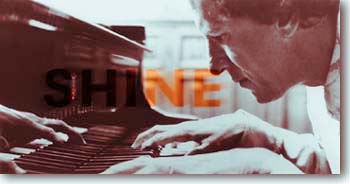All Keyed Up Inside
Shoot the Piano Playing: Pianist David Helfgott (Geoffrey Rush)
attacks the keys with shattering intensity in "Shine."
'Shine' tracks the roller-coaster career of troubled Australian pianist David Helfgott
By Richard von Busack
FOR SHEER TECHNIQUE, Shine will be so highly praised that people will be blinded to its occasional slickness. Even some of the most blatant scenes are effective.
A good example is the depiction of a piano recital in the same visual terms as one of the fights in Raging Bull. The borrowing from Scorsese comes complete with the slow-motion halo of sweat and the hero's fall to the canvas--excuse me, to the floor of the recital hall.
Years later, the undone pianist, David Helfgott (Geoffrey Rush), is raving away in the mental hospital, talking almost incoherently to a visiting woman playing "Bicycle Built for Two" on the spinet in the day room. When Helfgott tells her his name, the music abruptly stops, just like the saloon piano used to when the gunslinger walked through the swinging doors.
Shine Online:
The Fine Line Features Shine web page.
The Austrailian Ronin Films Shine web page.
About David Helfgott, the real-life pianist the movie is based on.
Director Scott Hicks certainly has a calculating streak, and he subscribes to that movie rule that intellectual pursuits ought to be filmed like Flashdance. Hicks' occasional grandstanding is most obvious in the scenes with John Gielgud. The theatrical knight plays a professor of music exhorting the hero (Noah Taylor as young Helfgott), croaking away as if he were Burgess Meredith pep-talking Rocky: "You have to tame the piano! It's a monster! Tame it or it will swallow you whole!"
The story is supposedly true. Helfgott, a promising Australian concert pianist, went cackling mad after a bout with Rachmaninoff's fiendishly difficult Third Symphony. His childhood (Alex Rafalowicz plays Helfgott in these scenes) was part of the strain that cracked him. His father, Elias (Armin Mueller-Stahl), would have found a kindred spirit in the elder Mr. Kafka. Elias Helfgott's emasculating love, the movie tells us, had a hand in David's piano-shock. Whether you're suspicious of the premise or not, Mueller-Stahl makes you feel it, and feel it sharply.
This product of love and battering grows into a chattering mutterer, an enthusiastic chain-smoker. Rush's Helfgott isn't monochromatic. His speech accelerates depending on his moods, and he's gone nuts as a musician would--rhythmically and with riffs. Hicks' conceit is that Rush's speech speeds up as he gets closer to the big breakdown on stage. And the soundtrack complements the before-and-after motif. Prior to the crackup, Helfgott plays Chopin; afterward, he loves high-velocity pieces like "Flight of the Bumble Bee."
While I understand Hicks' impulse to bring out the physicality of piano playing, the quieter moments work better than the noisy, sweaty corners of the film. Hicks knows how to make a melodramatic story smooth, ironic and indirect.
The film's ending is more touching in its dry comedy than if Hicks had scaled it up for more impact. Among the last lines is an offhand comment by an astrologer (Lynn Redgrave) summing up David's troubles. These, in her view, were due not just to Old Testamentstyle fathering or a nervous temperament but also to the malign influence of the planet Saturn.
[ Metro | Metroactive Central | Archives ]
This page was designed and created by the Boulevards team.

Mark Tillie![[line]](/gifs/line.gif)
![[line]](/gifs/line.gif)
Shine (PG-13; 105 min.), directed by Scott Hicks, written by Jan Sardi, photographed by Geoffrey Simpson and starring Geoffrey Rush.
From the Dec. 26, 1996 to Jan. 1, 1997 issue of Metro
![[Metroactive Movies]](/movies/gifs/movies468.gif)